November 2021
Contents

Foreword from Belfast’s Community Planning and city partners
The Belfast Agenda, the city’s first community plan, was created by Belfast City Council in partnership with its community planning partner organisations and published in November 2017.
This document outlines the work that we have undertaken since the publication of our previous statement of progress in 2019. This second phase delivery period has coincided with the COVID-19 pandemic. Belfast’s response to the COVID-19 pandemic has demonstrated how much partnership working has been aided by the community planning process. The collective leadership of community planning partners alongside grass-roots community organisations, working together, has never been more important. These relationships should be sustained.
During the initial stages of the pandemic, all partner organisations focused on ensuring the continued delivery of critical services to residents and businesses across the city. As restrictions eased, we all worked to ensure residents’ safety, health and wellbeing; and our city’s economic recovery by re-opening key services and supporting businesses to re-open safely.
As the effects of the pandemic come to light, we continue to work to understand how our city economy and communities are likely to be impacted by COVID-19, and what we need to focus on to rebuild in the coming months and years. The pandemic is not over, and we will need to sustain our efforts to protect citizens’ safety and health, while at the same time balancing the need to re-open our city economy where it is safe to do so. The Community Planning Partnership, alongside other key partnerships and organisations will continue to deliver on the Belfast Agenda ambitions, albeit through the lens of these new challenges.
We will work collaboratively to regenerate our city; to achieve resilient and inclusive recovery; to explore how Belfast can be repositioned to protect and grow the regional economy; and to develop an investment proposition which benefits our people. We will proactively engage with our communities to identify local challenges, priorities and opportunities and co-design interventions and programmes that will deliver improved outcomes for people living in Belfast.
This Statement of Progress outlines the latest stage of our journey as a partnership to deliver the Belfast Agenda ambitions and priorities and the future direction of travel we are collectively committed to. As part of this journey, we are currently reviewing the Belfast Agenda and will publish the refreshed plan in spring 2022.
Community planning and city partners
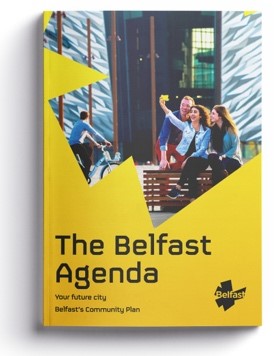
The Belfast Agenda and the community planning process is a significant catalyst for the city, bringing together partner organisations, regional government departments and agencies, the council and local communities to work collaboratively to deliver our shared vision. It’s about creating real, sustainable improvements in people’s wellbeing and quality of life in our city.
“Our Vision for Belfast in 2035…
A confident and successful city energising a dynamic and prosperous city region. A magnet for talent and business and admired around the world. A city people dream to visit. Belfast will be a city re-imagined and resurgent. A great place to live and work for everyone. Beautiful, well connected and culturally vibrant, it will be a sustainable city shared and loved by all its citizens, free from the legacy of conflict. A compassionate city offering opportunities for everyone."
Our ambitions
There are many things that we need to do to make our vision a reality. We’ve set ourselves four very bold ambitions to be achieved by 2035 - our progress against these longer-term targets is:
- We’ve created an additional 6,369 jobs in the city.
- The city’s population has increased by 3,653 people.
- The life expectancy gap between the most and least deprived areas has increased for both males (10.5) and females (7.6).
- 94.7 per cent of school leavers entered further or higher education, employment or training.
Focusing on outcomes
Residents and city partners identified five key outcomes they want to achieve by 2035 working together.
Belfast will be a city...
- where everyone benefits from a thriving and prosperous economy.
- that is welcoming, safe, fair and inclusive for all.
- that is vibrant, attractive, connected and environmentally sustainable.
- where everyone experiences good health and wellbeing.
- where everyone fulfils their potential.
A collaborative city leadership model
The Belfast Community Planning Partnership (CPP) was established in February 2018 with a shared aim to improve the economic, social and environmental wellbeing of our communities and all citizens.
With a focus on delivering outcomes, investment and improvements across the city, four thematic delivery boards have been established to drive collaboration across sectors and partners and deliver the agreed priorities of the CPP.
- Living Here Board
- Resilience and Sustainability Board
- City Development Board
- Job, Skills and Education Board
Each delivery board has the ability to form task and finish groups to give focus and drive forward specific priority areas, seek to problem-solve, innovate and develop focused action plans.
Connecting with the voluntary, community and social enterprise sector
Recognising Belfast’s vibrant and active voluntary, community and social enterprise (VCSE) sector, and to further strengthen the sector’s involvement in the community planning process, a new pioneering VCSE Sectoral Advisory Panel was established in spring 2020.
The Panel comprises 15 representatives, drawn from Belfast's large and diverse voluntary, community and social enterprise sector, reflecting a spread of themes, areas of the city, and large and small organisations.
Its aims are:
- to ensure that the sector’s voices are represented in the community planning process
- to develop and improve cross-sectoral relationships and partnerships
- to promote effective community engagement
Whilst formally established in spring 2020, due to the COVID-19 pandemic, the Panel came together virtually for the first time in June 2020 and has worked continuously since.
On 30 November 2020, the Panel held its inaugural Community Conference, ‘Putting Community Wellbeing at the Heart of Community Planning’. Delivered virtually, the conference provided the opportunity for 150 delegates to hear about the Panel’s work, learn from community wellbeing approaches in Scotland and Wales, and to discuss implications for the community planning process in Belfast.
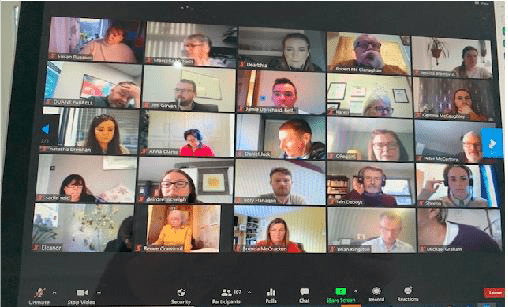
The Panel is currently organising a second conference which will take place in November 2021 and has started a programme of sectoral engagement sessions with the wider third sector on a range of thematic areas including health and wellbeing, the environment and education and training.
Delivering together
Since publishing the Belfast Agenda Statement of Progress in November 2019, together we delivered successful outcomes in several important areas.
Jobs, skills and education
Connecting people to opportunities
- Provided 7,000 digital devices to pupils in Belfast to support home learning during the Covid-19 pandemic
- Launched a citywide GCSE revision programme to provide support to 365 young people per academic year
- Implemented a citywide Youth Support Programme to help 180 young people each year who are at risk of dropping out of the education system
- Maintained our membership of the UNESCO Global Network of Learning Cities and received an award recognising our good practice in promoting quality education and lifelong learning opportunities
- Delivered a wide range of employment academies and interventions to connect residents with new or better employment opportunities
- Established Belfast’s first ever Labour Market Partnership to help improve employability outcomes and connect employers with employees
- Developed a bespoke City Charter for Belfast – The Belfast Business Promise – to support the city’s inclusive growth ambitions
- Delivered five emergency recovery schemes, distributing £22.5m to 2,906 Belfast businesses during the pandemic
- Provided over £175m to Belfast businesses, helping to secure £1.048 billion investment and helping to create 8,349 jobs
- Supported 2,255 individuals to take positive steps towards starting a business or social enterprise with 1,029 individuals going on to start a business or social enterprise, creating 683 jobs
- Continued to progress a £850 million Belfast Region City Deal for investment in important city infrastructure, digital innovation and tourism assets which will create up to 20,000 new jobs
Living here
Making life better for all our residents
- Established a Belfast Response Hub to support vulnerable people during the pandemic which delivered 110,000 food parcels - 9,300 medicines; 1,300 resilience packs; and handled 15,000 helpline calls
- Provided support to over 300 vulnerable households across the city through the Belfast Warm and Well Programme
- Established a multi-agency partnership programme to support Belfast’s most vulnerable and disengaged people
- Invested £75m in 40 capital projects in neighbourhoods across the city
- Invested £82.4m in six new world-class leisure facilities across the city
- Built 537 new social homes across the city (1391 since publishing the Belfast Agenda)
- Developed plans for a new £8m neighbourhood regeneration fund to drive recovery and transformation in local areas and communities
- Established a multi-agency support hub pilot project in south Belfast, designed to support vulnerable people experiencing a range of problems, which may lead to offending, affect personal safety or mental health.
Progressing the Belfast Peace IV Programme
City development
Creating an attractive, vibrant and connected city
- Delivered a £4.39m revitalisation programme to support businesses, communities, and residents to make better use of public space during the pandemic
- Established a housing led Regeneration group to contribute to the target of welcoming an additional 66,000 residents and address housing stress in Belfast
- Developed Belfast’s Local Development Plan
- Secured endorsement of the “A Bolder Vision” City Centre Connectivity Strategy
- Progressed plans for a major city centre tourist attraction, the ‘Destination Hub’.
- Worked with partners to manage the impact of the Primark fire on the city centre
- Transformed and rejuvenated seven of Belfast’s unique historical entries and lanes, protecting our built environment and heritage
- Established a Renewed Ambition programme to ensure Belfast is better positioned to attract investment and deliver inclusive growth commitments
- Established the Innovation City Belfast partnership to drive forward our plans to make Belfast a global destination of choice for innovation and investment
Resilience and sustainability
Creating a sustainable and climate friendly city
- Developed a city leadership model and structures to help a range of partners focus on the resilience and climate challenges facing Belfast.
- Established a climate crisis working group involving councillors in Belfast City Council and a Climate Commission to enhance civic and city leadership in tackling the climate crisis
- Developed the Belfast Resilience Strategy and the Belfast Net Zero Carbon Roadmap to help shape city plans and green investment
- Started delivery of the ‘One Million Trees Programme’ with 40,000 trees planted in year one and £500,000 funding secured
- Completed an assessment of air quality and identified measures needed to make air quality improvements across the city
- Enhanced access for communities and families to open green spaces to improve mental and physical wellbeing and enable social interaction
- Worked with partners through the Core Cities Climate Investment Platform and through the Place Based Climate Action Network to look at climate financial solutions and establish how we move to net zero emissions as a city
- Developed proposals with input from partners to create a Climate Fund within Belfast City Council
Supporting our communities during the Covid-19 Pandemic
The past year has been incredibly challenging for everyone around the world. Covid-19 has brought new challenges for our health, for society and for the economy. Individuals, communities and Belfast’s community planning partners have pulled together – promoting public health guidance and restrictions, adapting services for an ever-changing environment and supporting each other during this difficult and unprecedented time.
Belfast has demonstrated its resilience and ability to adapt and respond to major challenges in a flexible and cohesive way during these testing times - evidenced by the significant response provided to support our most vulnerable citizens during the initial lockdown period.
Supporting communities and vulnerable people

Our resilient communities were first to respond to the pandemic and have once again shown the strength of the sector in challenging times.
Working with the Department for Communities (DfC) and a wide range of community, voluntary and statutory partners, we established a Belfast Response Hub on 31 March 2020 to provide essential support for our most vulnerable residents during the pandemic. The Ulster Hall became a food distribution hub and we established a remote customer helpline and contact centre.
Key achievements:
- 110,000 food parcels distributed
- 15,000 calls handled by the council’s and community run helplines
- 9,300 prescription pick-ups and medicine deliveries
- 1,300 resilience packs provided
- Over £1.6 million + funding provided to over 280 local community and voluntary organisations to support vulnerable people and families and assist with community recovery
- £6 million council grants programmes delivered to ensure important support services and programmes continued across the city
“Thank you so very much for helping us access support when we had nowhere else to turn to. You were very effective in making things happen. We just can’t thank you enough.”
(Belfast resident)
Supporting the business community
Working collaboratively across government and with our business community, we delivered a series of support measures and recovery plans to protect Belfast businesses, jobs and employees. Community planning partners mobilised together to raise awareness of the support available – resulting in Invest NI’s Business Support Team handling over 35,500 telephone calls in 2020-21, a 600 per cent increase on a standard year, and dealing with almost 11,000 specific email enquiries.
At the end of the 2020-21 financial year, Invest NI had supported the NI Executive to deliver five emergency recovery schemes, distributing £22.5 million to 2,906 businesses in the Belfast City Council area.
Covid-19 Revitalisation Programme
We worked with government, business and community partners to design and deliver a £4.39 million investment programme, enabling a range of economic, cultural and physical interventions to support businesses, communities and residents during the pandemic and to make better use of public space in the city
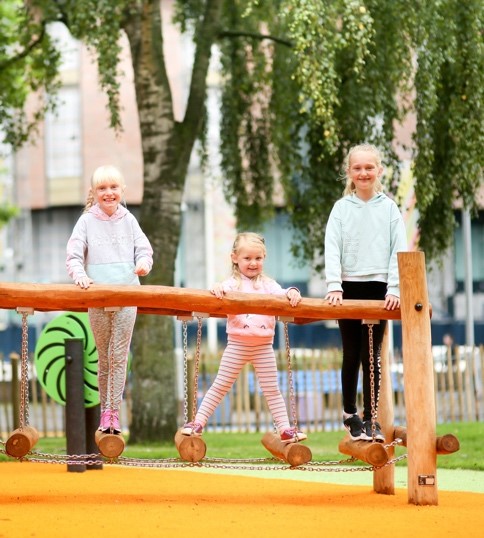
Interventions included:
- City parklets to improve outdoor spaces and enhance the city living experience for residents
- Enhancing Belfast Bikes with a fleet of 450 new smart bikes, allowing people access to a more efficient, sustainable mode of transport and encouraging people to experience the city in a new way
- Delivery of Business Cluster and Community Grants schemes
- Collaborative city centre projects including: Castle Place Hub, Adelaide Street parklet and public realm scheme, connectivity scheme in Church Lane area and the Cathedral Gardens Active Travel Hub
Adding value
‘At this early stage of development, community planning and the Belfast Agenda has helped enhance how city partners work together, challenging organisational silos and developing new collaborative solutions to local priorities. With a focus on addressing some of the acute issues facing people in our city, there are already some exemplars of movement and success. The following section provides an overview of the added value being created through community planning.
Improving health and wellbeing
The Community Planning Partnership is determined to work in collaboration to create a healthier city, recognising the significant impact of the pandemic on widening existing inequalities. During the pandemic, the pace of integration across partners accelerated, with a reinforced commitment and energy to collaborate to make a difference. Because of this work, we have initiated the following:
Belfast Warm and Well
“This has changed our lives, we are so much warmer than before, we were delighted with the service and the new system.”
(elderly Belfast couple)
Led by the Health and Social Care Board Local Commissioning Group, with support from a consortium of partners including the Public Health Agency (PHA), Belfast Health Development Unit, Belfast City Council, National Energy Action (NEA) and many community and voluntary organisations across the city, the Belfast Warm and Well initiative helps local people struggling to keep their home warm through advice, practical support, and discretionary financial assistance and seeks to address avoidable winter deaths.
The project was developed using good practice, based on NHS National Institute of Clinical Excellence (NICE) quality standards for helping people at risk of avoidable death or ill-health during the winter. Information on fuel poverty, health conditions and age were provided by partners and combined to provide targeted support to those most in need.
Support in 2020-21 included:
- Referrals increased by 107 per cent (on previous year) in the year two of the project (2019-21), which saw two pilot areas extended to the whole city
- Over 300 vulnerable households have benefited from support to date
- 265 home assessments were completed for those living in cold and damp conditions to identify to energy efficiency measures
Partners are committed to the eventual eradication of fuel poverty in Belfast and we are working closely with government and city partners to bring forward short-term interventions and support (e.g. through the affordable warmth scheme, home insulation, financial support and advice services) to support those individuals and families in need. We are seeking to inform, shape and accelerate important new emerging strategies such as the Energy and Fuel Poverty strategies to be brought forward by NI Executive departments. There will be a continued commitment and shared focus by the community planning partners on this initiative going forward.
Supporting vulnerable people with complex lives
The Belfast Complex Lives initiative supports some of Belfast’s most vulnerable citizens with complex needs. These are people who have fallen into a cycle involving some or all the following behaviours - rough sleeping, addiction, poor mental and physical health and offending.
Life for people in these situations can be challenging, chaotic, dangerous and can feel hopeless - moving between life on the streets, in hostels, temporary accommodation or sometimes prison. We know that breaking out of this cycle is difficult for people and these complex needs cannot be met by a single agency or service.
The Belfast Community Planning Partnership sought to create a new approach which focuses on the needs of the individual. This led to the establishment of a multi-agency partnership, which integrates the work of service providers, city partners (NIHE, BCC, PHA, BHSCT, PSNI, BHDU, PBNI, Ascert/BDACT) and other voluntary and community organisations. All partners are committed to develop, test and deliver a new Complex Lives approach within Belfast that aims to:
- support the recovery, resettlement, and social inclusion of people in Belfast living complex lives
- connect and build trust with people – using existing positive relationships with services
- work together as a multi-agency, multi-disciplinary team to agree a plan, with the voice of the service user at its centre
- provide a trusted key worker (where needed) to stay with people through their journey
- provide initial stability and appropriate accommodation with wrap-around support
- help people re-integrate into community life through positive connections
A key part of the work is to make it easier for services from the statutory, voluntary and community sectors to collaborate and create a new delivery approach. This involves introducing systems for case management and joint approaches to commissioning; communicating and sharing information; developing workforce and volunteer skills and training to work together in new ways. The approach is being tested in three phases with the aim that it will become a new business model for service delivery partners from April 2022.
- May - September 2021: Focus on B&B and Hotel Cohort. Selected features of model.
- From October 2021: Prototyping of Whole System Model 'Day 1 ready to go'
- From April 2022: Mainstreaming of Whole System Model
There is still a long way to go, but so far, we are positive that we are moving in the right direction. Strong partnership work is required over a longer period and we are committed to finding a new way to help and support Belfast’s most vulnerable and disengaged people with complex lives.
Multi-agency support hub
Led by the PSNI, with direct involvement from a wide range of city partners including HSCT, BCC, NIHE, Youth Justice Agency, PBNI, EA, NIAS, NIFR, a multi-agency support hub has been established in south Belfast as a pathfinder. The Support Hub is designed to help vulnerable people access the right help, at the right time, from the right organisations in the local area.
The hub supports vulnerable people who are experiencing a range of problems, including: being a victim of ongoing anti-social behaviour or crime and being drawn into behaviour which may lead to offending and being in difficult situations which can affect personal safety or mental health. While this approach has been trialled elsewhere, this is the first time it is being tested and possibly expanded in Belfast.
Housing
A key focus has been to work collaboratively to address the housing needs for a growing population. Covering the full range of housing, including affordable and social housing, community planning has brought partners together to explore
and seek to address the challenges constraining housing development. It has created a shared call to action across partners to work together to unlock and enable housing development and support Belfast’s population growth ambitions.
Since 2019:
- a housing supply strategy is being developed by NIHE to provide a delivery framework for the right volume and types of homes to meet changing patterns of demand
- strategic site assessments and public land availability analysis have been completed to identify potential for housing development across the city
- newer funding streams have been explored and maximised to increase social housing capacity and underpin any new housing supply strategy
- city centre waiting list for social housing has been developed, with a latent demand list put in place for developments in the city centre as they come forward
- 537 new social housing units (including 442 new builds) have been built across the city. This represents 1,391 social homes since the Belfast Agenda was published.
- the draft strategy as part of Belfast’s Local Development Plan has been published and its public examination has been completed. It includes a commitment to provide 31,000 additional homes by 2035, with an estimated 8,000 units in the city centre
- a housing-led regeneration group has been formed, chaired by the Northern Ireland Housing Executive, and comprising key partners, to bring a collaborative focus and build momentum to address housing stress and contribute to Belfast’s population growth ambitions.
City development
Creating the conditions for growth and opportunity in the city
In 2017, the public told us that the kind of city that they wanted was one that was connected, well-planned, with the right infrastructure to succeed. We committed to working in partnership on a number of workstreams which would help to build a resilient infrastructure that connects people and places, as well as creating the conditions for Belfast to compete for investment, tourism and talent on a global platform.
Covid-19 has changed how cities are seen and function, how public spaces are used, as well as how people connect, work and travel. Much work continues to be done to enhance Belfast’s physical and cultural regeneration and create vibrant and connected neighbourhoods.
Since 2019:
- We created a draft Belfast Local Development Plan, which is currently undergoing Independent Examination.
- We developed and secured DfC and Department for Infrastructure (DfI) Ministerial endorsement of the City Centre Connectivity Study, ‘A Bolder Vision’, outlining key proposals to enhance the city Centre’s green, walkable and cyclable network and the important connections into surrounding communities. This will encourage active and sustainable travel; help improve physical health and wellbeing and restore pride of place.
- We brought forward a proposition for a new, transformational Belfast tourism attraction ‘the Destination Hub’ as part of the Belfast Region City Deal. This major tourism anchor will help boost the industry and create a focal point allowing people to connect with the city and one another through stories, screen and social spaces. The ‘beating heart’ of the hub is Belfast Stories, a visitor experience that will tell first-person accounts of the city by the people who call it home.
- We delivered a range of partner interventions to enhance our built environment, including the creation of new open, green and shared places, rejuvenation of seven of Belfast’s unique historical entries and lanes (Castle Arcade; Winecellar Entry; Crown Entry; Wilson’s Court; Joy’s Entry; Pottinger’s Entry and Cole’s Alley); and enhanced city lighting as part of the new ‘A Luminous City’ lighting strategy.
- We built on positive changes in public attitudes and behaviours emerging from the pandemic by bringing forward initiatives to enhance sustainable city infrastructure and improve connectivity. This includes development and consultation on Belfast Rapid Transit phase two for north and south Belfast.
- The Minister for Infrastructure published the 'Belfast Cycling Network', in June 2021, providing a blueprint for the development and delivery of coherent, connected and safe infrastructure for everyday cycling in Belfast over the next 10 years.
Positioning the city to compete
As we continue to live with COVID-19 and its impact on all our lives, we must look towards the future and position our city and the city region to take advantage of every opportunity.
A public-private city initiative the ‘Renewed Ambition Programme’ has been developed to shape how we reimagine the future of our city now and act together to build on what has already been achieved to maintain our competitiveness and attractiveness, and position Belfast as an investment and tourist destination. Renewed Ambition seeks to attract investment into the city, creating jobs and opportunity and creating important economic and social infrastructure.
Investing in our communities and local assets
The pandemic has further intensified existing inequalities and created additional, significant economic and social challenges for our communities in coming years.
Creating local assets and facilities
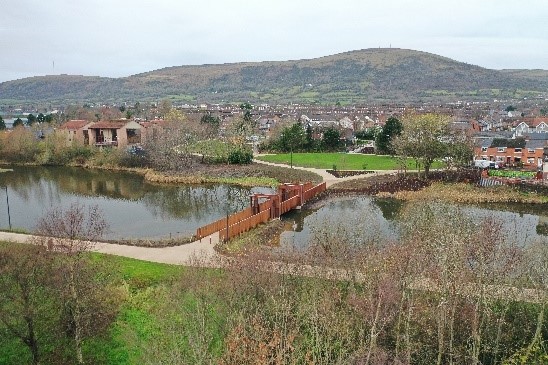
Since our last Statement of Progress in 2019, city partners have continued to invest in local assets and facilities and maximise the economic and social benefits of such investment. We have completed 40 projects with an approximate value of £75 million within this period, creating jobs, training opportunities and making a real difference to people’s lives and behaviours. Examples include £1.2 million transformation of Springfield Dam and the creation of a new park and associated recreational, educational, physical activity and event space.
Building community capacity
Communities were first to respond to the pandemic and have shown the strength and resilience of the sector in challenging times. Working in partnership, we have sought to build upon these strong foundations and continue to invest, including council allocation of £1.6 million funding to over 280 local community and voluntary organisations to support vulnerable people and families and assist community recovery. We have continued to deliver targeted grant support programmes, including £6 million in council grants, to ensure important support services and programmes are delivered without interruption across the city.
We have invested in the development of local facilities and services including Cancer Lifeline and Grace Family Centre.
“As the Chair and founder member of Cancer Lifeline, to finally see the newly redeveloped premises has been a lifelong dream come true for me and the rest of our volunteer committee. North Belfast now has a fantastic, modern, fit for purpose, new cancer support centre.” (Bernadette Montgomery MBE, Chairperson of Cancer Lifeline)
“Grace Women’s Development Limited would like to thank the community for their support throughout the development of the new family centre. This is a tribute to their wish to turn a blight in the area into a purpose-built family centre. Our doors are now open, and we look forward to welcoming them and continuing to work in partnership to create a vibrant family hub.” (Sally Smyth, Manager of Grace Family Centre)
Leisure transformation programme
We have continued to invest in transforming Belfast’s leisure provision with four new state-of-the-art facilities at Olympia, Lisnasharragh, Andersonstown and Brook since the Belfast Agenda was published.
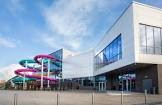
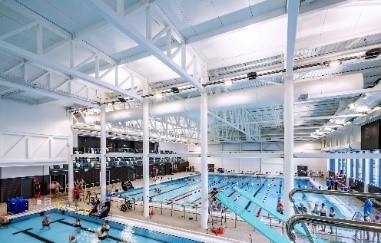
Construction is also well underway at Avoniel, due to open in winter 2021, and the newly restored and extended Templemore Baths will be open by summer 2022.
Each centre will offer a unique selling point as well as state-of-the-art pools, fitness suites and pitches. Working collaboratively with GLL, our leisure service delivery partner, and despite the Covid-19 pandemic, significant health and wellbeing outcomes have been realised, creating jobs and skills opportunities for local people.
Key highlights from the investment in the new leisure facilities:
- just under 10,000 live pre-paid members (over 50 per cent of the city’s total)
- over 1,600 live members in GLL’s Swim School
- over 1,000 live junior gym members
- over 1.3 million user visits
- 635,000 swim visits
- 445,000 gym and class visits
- 500 new health referrals
- over 100 new jobs created linked to operations and 13 new construction posts created
- 7 leisure academies delivered
- 44 apprenticeships delivered
- 40+ young people receiving industry specific training, with 37 now started their careers with GLL
- small business friendly procurement policy
- over £30,000 donated to local community initiatives and £7,500 to establish Go Social Programme
Neighbourhood regeneration fund
We are bringing forward a new £8 million neighbourhood regeneration fund and will seek to lever additional investment to drive recovery and transformation in local areas and communities. It has been designed to have maximum impact in neighbourhoods and will contribute to a number of Belfast Agenda priorities including the economy, tourism and sustainability.
Creating safe and shared places
We continued to work with communities and city partners to create a safe, inclusive and shared city and places through the delivery of the Good Relations Strategy and ensure maximum impact of investment and programmes supported through Peace IV funding and the new PEACE PLUS programme.
Some Shared City Partnership delivery highlights include:
- Shared Spaces and Services – opened the Springfield Dam and Park as part of the £5.1 million Forth Meadow Greenway project and delivered a programme of activities to animate the site and encourage usage.
- Building positive relations – supported over 800 people to participate in projects that focus on building positive relations including network development, creative arts, leadership and understanding shared history.
- Supporting new and minority communities – promoted the inclusion and integration of new communities, including the facilitation of the Migrant Forum which seeks to ensure access to services for new communities.
- Grant aid – supported local responses to locally identified good relations issues.
- Interface Programme – worked with interface communities to develop relationships, create shared spaces and remove barriers.
The impacts of this work include an improved sense of community relations; improved knowledge and positive perception of different communities in Belfast; and improved leadership skills and confidence.
Supporting our people
Children and young people
Ensuring our children and young people have the best start in life is a key priority and focus of the Belfast Agenda and the work of the Community Planning Partnership.
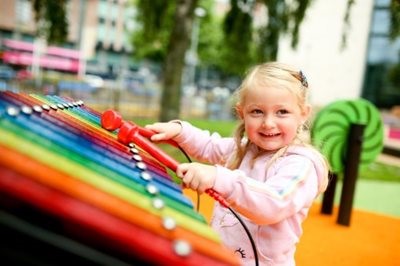
We’ve delivered a programme of work over the last two years to enhance children and young people’s experience of Belfast including:
- Reconstituting the Belfast City Youth Council, comprising 40 young people from communities across the city, helping to inform them on how our city is run and address important challenges. The Youth Council produced a mental health advocacy toolkit for young people in partnership with the Northern Ireland Youth Forum and the NICCY Youth Panel.
- Engaging over 1,700 participants in Peace IV cross community projects including technology, play, sports, advocacy and network building, delivered through statutory partners, schools, community groups, youth groups and sports clubs.
- Facilitating thousands of play opportunities through a citywide play team.
- Adoption of the Urban Childhoods framework which seeks to make the city more child friendly by creating more outdoor, shared spaces. This has become even more important as we move forward in our recovery from Covid, and create a more connected, resilient city.
Responding to the impact of the pandemic on children and young people and their families, city partners came together to deliver effective, responsive interventions including a therapeutic family play programme, digital poverty support and baby support packs (for children under the age of 2).
Partners remain committed to working together to support children and young people and their families through existing partnership structures, including the Belfast and South Eastern area outcomes groups, locality planning groups and family support hubs. Being innovative and adopting a multi-agency approach is the best way to meet needs, maximise resources and identify further opportunities to improve outcomes.
Creating an age-friendly Belfast
An age-friendly city is one in which organisations work together to make sure the quality of life for people is enhanced as they age.
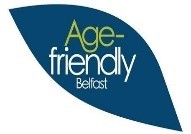
We are acutely aware of the challenges which may face many Belfast people and families as they age. Since publishing the Belfast Agenda, and as a member of the World Health Organisation’s global network of Age Friendly Cities, Belfast’s Healthy Ageing Strategic Partnership has continued to help reduce social isolation, support housing needs, promote physical activity and address poverty for older people.
The partnership’s interventions proved to be even more important throughout the Covid-19 pandemic and included:
- addressing loneliness and social isolation through gatherings or events which brought people together both virtually and in-person when safe to do so
- encouraging more older people to volunteer through the age-friendly volunteers programme, annual age-friendly volunteer awards and working closely with Volunteer Now
- working in partnership with the Northern Ireland Housing Executive to inform the first Older People’s Housing Strategy for Northern Ireland
- encouraging active lifestyles through organised walks in the park, exercise classes in leisure and community centres and using the city’s greenways; promotion of the ‘Keeping well at Home’ booklet and ‘Moving with Mary’ DVD developed by the Public Health Agency, Age NI and Dame Mary Peters - delivered to over 10,000 people across Belfast
- supporting the extension of dementia friendly neighbourhoods and network of dementia friends and champions across Belfast
- supporting the roll-out of the ‘Hug in a Box’ scheme, developed by Engage with Age, North Belfast Senior Citizens’ Forum and Volunteer Now working alongside Greater Belfast Seniors’ Forum. This was enhanced by the Covid-19 response fund, with 600 boxes delivered to isolated older people.
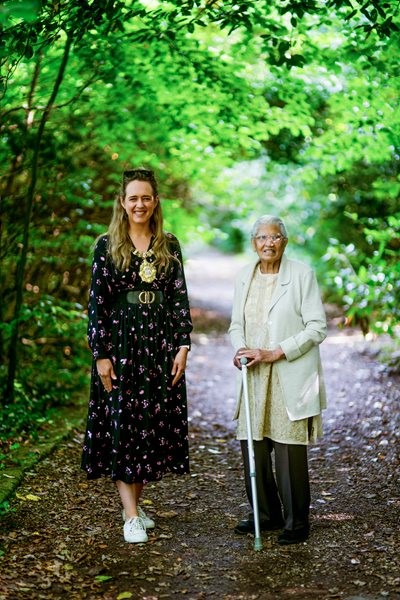
“Helped me feel part of the wider community”
(Belfast resident)
“Unexpected. Would have loved to hug the delivery man”
(Belfast resident)
Improving educational outcomes
Community planning partners recognise the fundamental contribution that education makes to communities’ and individuals’ lives and the economy and they’re committed to addressing educational inequalities in Belfast.
These partners have formed an inter-agency group
- Education Authority
- Belfast Area Partnership Boards
- Belfast City Council
- Belfast Met
- Council for Catholic Maintained Schools
- Department of Education
- Queen’s University Belfast
- St Mary’s University College
- Stranmillis University College
- Ulster University
- Urban Villages
Using an evidence-based approach, they have collaborated to deliver:
GCSE support programme
The group secured funding to deliver a city-wide GCSE Support Programme to improve at least 365 young people’s achievements in Maths and English at GCSE in school and community-based settings. Additional activities are currently being planned to include mid-term intensive learning programmes during the Halloween break.
Up to 180 young people who either already have or are at risk of dropping out of the education system, employment or training are also being supported each year through our Youth Support Programme. To date, 58 per cent of those who completed the programme have moved into employment or further education and training.
Addressing digital poverty
Thanks to the Department of Education and Education Authority, with support from other statutory and community partners, 7,000 Belfast pupils who had insufficient, or no access to learning devices during the pandemic benefited from a Digital Devices programme. In addition, more than 2,800 Wi-Fi access vouchers and Wi-Fi ‘dongles’ were provided to enable internet access for pupils from vulnerable backgrounds to facilitate home learning.
Creating a learning city
Belfast is a city that puts people at the heart of learning and where communities are actively engaged as the foundation of a lifelong learning society.
As a member of the UNESCO Global Network of Learning Cities, Belfast values learning in all its forms and as a force to improve quality of life, tackle inequalities and deliver a better city for all, by working with partners to put people.at the heart of learning. To ensure that our approach as a Learning City remains relevant and fit for existing and future challenges, we are also undertaking a review of what we have done so far which will lead into a Learning City Plan that is embedded within community planning.
Belfast has also signed a Memorandum of Understanding with a number of other cities who are part of an Irish Network of Learning Cities including Cork, Dublin, Limerick and the Derry and Strabane Region. The purpose of the joint MOU is to further strengthen the co-operation across the Network, committing the cities to continue to work together and share good practice.
In October 2021, Belfast received a UNESCO Learning City award in recognition of its approach to promoting and encouraging lifelong learning, enabling citizens to adapt to a rapidly changing world and to act jointly to solve city challenges.
Supporting local people into employment
The pandemic has disproportionately impacted upon those most vulnerable. People who were already having difficulty finding work experience further challenges with increasing numbers of experienced people moving into an already competitive job market.
Community planning partners have worked closely with employers to develop and deliver interventions and support, from mainstream employability and skills programmes through to bespoke sectoral employment academies. This has helped to connect residents with new or better employment opportunities, removing barriers to participation and supporting skills development.
Inclusive growth
We are committed to ensuring that the success of the city reaches everyone.
For the Community Planning Partnership inclusive growth means connecting all residents with economic growth and creating vibrant communities where everyone has the opportunity and aspiration to succeed. This ambition is embedded throughout our work as described in this statement. Some highlights include:
- improving basic skills and supporting people to access jobs and progress in work through our academies and skills programmes
- creating more apprenticeships
- supporting our social ambitions through our approach to purchasing goods and services and helping keep our spend within Belfast
- harnessing the collective hiring, training and purchasing power of anchor institutions (e.g. local authorities, NHS trusts, universities and colleges, Belfast Harbour etc)
- ensuring infrastructure investments deliver employment and training opportunities
- encouraging good employment practice, offering support and public recognition to businesses delivering good employment, and practical support to improve job quality in low pay sectors (including development of Business Charter or Business Promise which will help shape how employers use their employment, procurement and service delivery powers to support inclusive growth - economic growth that benefits all citizens and all communities.).
Belfast employment academies

Belfast City Council’s employment academies provide tailored training to help Belfast residents get jobs and help businesses meet increasing employment demand across sectors including logistics, leisure, bus and taxi driving, construction, hospitality, business, health and social care, childcare and play work.
Since 2019, over 1,100 people accessed Employment Academies, with 700 (75 per cent) of them going on to secure a new or better job. In addition to the sectors above where we will continue to deliver Employment Academies, new job pathways are being developed for those who would otherwise not have the qualifications or experience for job roles within the digital sector are being created as well as job and skills pathways into new industries such a retrofitting.
We are also providing pre-employment training in conjunction with employers and Further and Higher Education providers, to create a pipeline of skilled people to work in expanding local businesses. More than 600 graduate level jobseekers have participated in 27 Assured Skills Academies delivered by Belfast Metropolitan College, with 92 per cent of participants going on to secure employment with a wide range of top companies such as PwC, FinTrU and Microsoft.
Belfast Metropolitan College delivered 53 different courses through the Department for the Economy’s Skills Intervention Programme funding as part of the Covid-19 response. 778 learners gained qualifications in digital construction and business information modelling, leadership and management, digital marketing and social media, cybersecurity, networking, cloud computing and health and wellbeing.
Belfast Labour Market Partnership
Working with community planning partners through the Department for Communities’ Employability NI programme, we have created Belfast’s first ever Labour Market Partnership (LMP). It aims to improve labour market conditions and meet employment supply and demand needs in Belfast.
Short-medium term themes:
- Quickly back to work: ensuring a coordinated response helping the substantial number of people in Belfast who have been, or are risk of being made employed move quickly back into employment or training
- Increasing opportunities: empowering those furthest from the labour market to succeed through quality support, including those who will be considered long-term unemployed as a consequence of COVID-19
- No-one left behind: targeting disadvantaged groups through the delivery of an integrated and holistic local employability approach; and
- Catching up: re-skilling and upskilling for those unemployed or on low incomes.
The ambition of the Labour Market Partnership is to establish:
- The Belfast Labour Market Observatory, which will identify and analyse labour market trends and challenges, directing the work of all employability and skills interventions in the city to match supply of skills and people with job demand in the city. This will also create a framework of provision in Belfast: improving information and intelligence on existing provision and help for individuals and employers to navigate the range of services on offer.
- A Gateway independent advice and guidance outside of mainstream Jobs and Benefits support for those who are out of work and not job-ready such as long-term unemployed and those who are receiving economically inactive benefits.
- Employment pathways to increase the capacity of Employment Academies to support more people into work and be able to offer differentiated approaches for different groups of people, such as a short-track reskilling interventions for those whose employment has been affected due to Covid-19 to more intensive interventions for those needing tailored support to gain a job.
- Enterprise pathways for those further back in the labour market to take the opportunity to become self-employed or set up their own business through bespoke, intensive, practical support.
- Working with providers in the city to look at how the positive job, education and training outcomes for young people can be enhanced.
- Develop place-based and people-based targeted interventions for those under-represented in the labour market or who face significant barriers to employment. These groups include (among others) those with a disability, justice system leavers, older people, lone parents, those living with health issues including mental health, ethnic minorities as well as people living in specific parts of the city where levels of long term unemployed and those receiving ‘economically inactive’ benefits are more than twice the city average.
Belfast business promise

Community planning partners are committed to working alongside the NI Executive and other partners to bring forward an integrated approach to supporting businesses, sustaining jobs and creating new and better employment opportunities in Belfast.
Working closely with the private, public and VCSE sectors we have co-developed a bespoke charter for Belfast and a pledge to create better employment conditions for all.
The launch of the Belfast Business Promise will be coming shortly and through this we pledge to work with organisations to create more high-quality jobs, lower levels of poverty, build stronger, healthier communities, reduce inequality in the workplace and work towards a more sustainable local economy. Organisations will be able to evaluate their business practices against eight pledges and gain support from the Belfast Business Promise community and network to improve their performance.
1. Provide fair wages and contracts
- ensuring your employees are paid the Real Living Wage - and have security around the hours they work
2. Offer opportunities into work
- Creating pathways into work by providing job and development opportunities, and removing barriers to employment
3. Support the local and social economy
- Using our purchasing power to support the local economy, increase competitiveness and add social value
4. Recruit inclusively
- Ensuring job accessibility for all Belfast residents and hiring across diverse communities
5. Improve training, engagement and well-being
- Creating a workplace where employees feel valued and can thrive
6. Pay Promptly
- Paying supplier invoices on time
7. Work in partnership with our communities
- Working in collaboration with local communities through meaningful engagement to bring about positive impact
8. Protect our environment
- Working together to tackle the global challenge of climate change and protect our environment for future generations
“From small stores to large organisations, we want to promote and support business leaders who care about making a real difference to the lives of the people in Belfast, the environment and the local economy.”
(local business representative forum)
Recognising talent and enhancing skills
Cities are full of people with unrecognised talents and potential
Working with RSA Cities of Learning, work is underway to develop a digital badges and skills passport for Belfast which gives people a portable record of achievement through employability interventions.
It also gives employers a new way to connect with talent in cities – an alternative to the standard practice of asking for evidence of academic qualifications and work experience.
The RSA Cities of Learning will work with us to challenge current employment practices which may be excluding individuals who do not have formal qualifications but possess the right aptitudes and strengths to make a valuable contribution to the workforce.
We’ll offer employability and skills providers across the city access to digital badging. The badges will recognise ‘hidden’ skills by creating a digital portfolio of the holder’s achievements and skills to use alongside traditional CVs, helping to address the disproportionate levels of individuals recorded as having “no or low” skills.
A key commitment within the Belfast Agenda is to attract investment, support business start-up and growth and ultimately create jobs and opportunity within the city.
Securing investment and creating jobs
City partners are working closely with Invest NI, the Northern Ireland Executive and the Department for the Economy, who have a regional responsibility, to secure investment and bring forward targeted programmes to support and enable local businesses to grow and compete globally.
Since the Belfast Agenda was published in 2017, Invest NI has provided total support of over £175 million to both local and externally owned businesses based in Belfast. This has secured over £1.048 billion of investment and assisted in the promotion and creation of 8,349 new jobs. This leveraging of private investment is a significant contributor to our Belfast Agenda targets. Over the past three years, assistance offered by Invest NI to Belfast based local companies increased by 31 per cent.
Leading through innovation
“Belfast is a city of creators and inventors. Innovation is in our DNA”
(source, Innovation City Belfast)
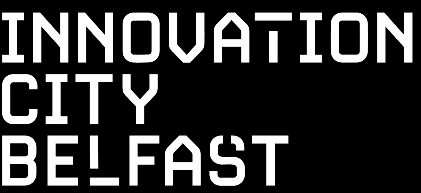
Innovation City Belfast is a new partnership between Belfast City Council, Belfast Harbour, Catalyst, Queen’s University Belfast, Ulster University, and advisory partner Invest Northern Ireland which aims to establish Belfast as a globally significant destination for innovation with a focus on these transformational priorities:
- developing a major Innovation District from Queen’s Island to York Street
- delivering a city-centre focused Smart District
- creating a Smart Port at Belfast Harbour
- investing in advanced wireless networks
- build the workforce’s skills for new jobs in the digital economy
Recognising the importance and opportunities presented to businesses through innovation, Invest NI has almost doubled (86 percent increase) investment in R&D in the past year - from £12.9 million in 2019-20 to £24.1 million in 2020-21.
Belfast’s reputation for innovation, skills and collaboration has also recently attracted a significant number of global investors including Agio, Asos, Ogletree Deakins and SafetyNetAccess. Belfast has also secured repeat investment from PwC, which is investing £40 million in a new Advanced Research and Engineering centre, creating 771 new technology and operational jobs over the next five years.
Supporting local business and enterprise
Through community planning we have worked with city partners and the business community to understand the needs and pressures facing local businesses and to co-design a range of support packages and interventions to address these and to support business enterprise and start-ups.
Key achievements over the past two years:
- supported over 1,545 individuals to explore starting a business
- supported 923 individuals to start a business, resulting in the creation of 578 jobs
- specialist advice given to 324 businesses with access to financial incentives or support up to £1,500
- engaged with 710 social enterprise and cooperative individuals and organisations and supported development of 106 new social enterprises or cooperatives, with 105 jobs created
- provided financial support to 47 organisations to sustain them through the Covid-19 pandemic
- 755 existing businesses supported to become more resilient and adapt to ongoing challenges presented by Covid and the UK’s exit from the EU
- over 150 companies supported by Belfast Met to innovate in IT, new product design and 3D printing, fashion and manufacturing and podcasting
- business incubation space and innovation and growth support provided to 62 businesses by the Innovation Factory, with a 66 per cent occupancy rate, including high level of interest from new firms in sectors including TV, film, digital, engineering and green tech
- continued support for businesses with the potential to scale beyond £1 million - participating companies have reported an increase in revenue of 114 per cent and have increased their employment base by 40 per cent
- profiled Belfast as a location of choice through the City Investment Service, engaging with more than 120 businesses and supporting them to locate here
- continued to build partnerships with Dublin, London and our Sister Cities - launching the Dublin Belfast Economic Corridor in partnership with the eight councils along the corridor, and developing the associated economic opportunities
Belfast Region City Deal
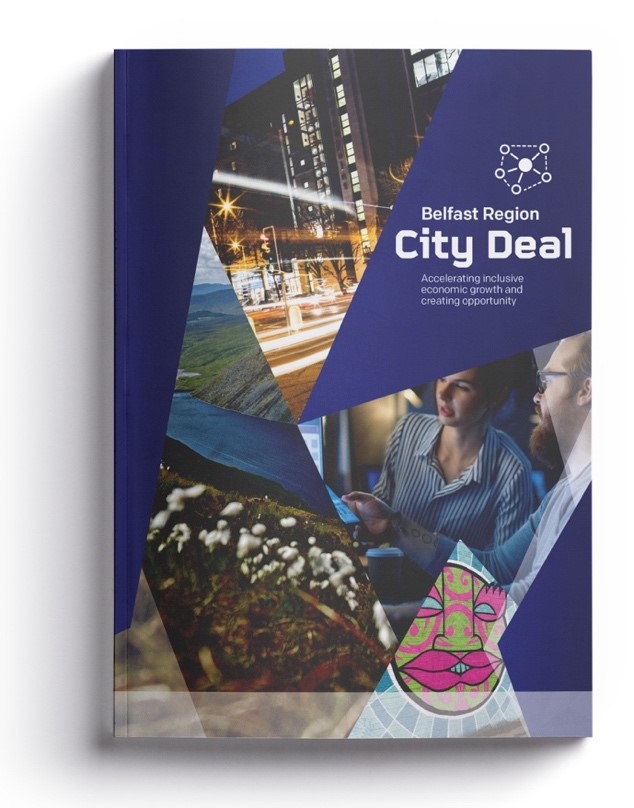
A key commitment within the Belfast Agenda was to secure a Belfast Region City Deal to support the delivery of the city’s ambitions, securing significant investment, jobs and opportunity.
Belfast Region City Deal (BRCD), the first City Deal for Northern Ireland, comprises six local authorities; Antrim and Newtownabbey Borough Council, Ards and North Down Borough Council, Belfast City Council, Lisburn and Castlereagh City Council, Mid and East Antrim Borough Council and Newry, Mourne and Down District Council, the region’s two universities; Queen’s University Belfast and Ulster University, and four of the region’s further education colleges; working collaboratively with NI and UK Governments and the private sector to create and deliver a £1billion programme of investment.
Work has continued at pace to prepare Outline Business Cases for 20 ambitious projects, underpinned by an employability and skills programme. Our plans were examined through the lens of the Covid-19 pandemic, and we’re confident that our projects are uniquely placed to support recovery, facilitate investment in businesses and in sectors which have the greatest potential for long-term growth, to drive productivity and create and sustain jobs.
Through this transformative investment, it’s estimated that over its lifetime the Belfast Region City Deal will:
- support the creation of up to 20,000 jobs
- connect local people to new and better jobs
- strengthen the region’s innovation capabilities and business offer in growth sectors
- deliver £400m in GVA directly on-site and within the Region
- target delivery of almost £1bn of private sector leverage
- create compelling world-class visitor attractions
- help to regenerate major towns and cities
Climate and sustainability
We’ve been working collaboratively to drive forward a city leadership model and a shared focus to address resilience and the climate challenges facing Belfast. Covid-19 demonstrated the importance of building resilience to crises and has accelerated our work on climate adaptation, mitigation and decarbonising our economy. The goal for city partners is to transition Belfast to an ‘inclusive, zero-emissions, climate resilient city.’
City partners developed the Belfast Resilience Strategy and a Belfast Net Zero Carbon Roadmap to help shape city plans and green investment going forward. The city’s Resilience Strategy sets the strategic framework for future work and will prepare Belfast for the shocks and stresses it faces, including our work on climate. The strategy has three priorities: Climate Adaptation and Mitigation; Participation of Children and Young People; and Connected Net Zero-Emissions Economy and includes the delivery of 30 programmes designed to be ‘multiple problem solvers.’
Key actions underway include:
- delivery of the One Million Trees programme, an ambitious 15-year city partnership approach to urban tree planting, with 40,000 trees planted in year one
- investing in our greenways and low-emissions public transport to provide sustainable and inclusive transport infrastructure and support connectivity, health and wellbeing and encouraging citizens to increase journeys by foot, wheeling, cycling and public transport
- working collaboratively with partners to ensure our infrastructure meets the city’s existing and future needs and remains resilient (for example wastewater energy and waste infrastructure)
- assessment of air quality and identification of measures needed to improve air quality across the city to deliver improved public health outcomes
- maximising use of our land assets and access to open green spaces for communities and families to improve mental and physical wellbeing and enable social interaction
- working with partners through the Core Cities Climate Investment Platform, and through the Place Based Climate Action Network, to look at climate financial solutions - how we pay for the move to net zero and adapt as a city
Stretch goals assessment
In 2017, community planning partners set a range of four year stretch goals for our original priorities. These ambitious targets provided collective focus for partners and helped to guide the decision-making process when agreeing actions to be delivered.
These points summarise the stretch goals which collectively we committed to deliver by 2021 and an indication of performance or progress towards each target.
Achieved
- Deliver £1billion of local physical investment including new leisure provision
- Invest £25million in health improvement and £4million in suicide prevention
- Reduce waste to landfill to 35 per cent
- Attract £1billion private sector investment
- Improve feeling of safety within neighbourhoods
- Create 3,000 new hotel bed spaces
- Create 4,000 business start-ups
Positive direction
- Create 15,000 new jobs
- Increase value of tourism to £500million
- Increase proportion qualified to Level 4
- Welcome 1.9million visitors
- Deliver 1,800 social housing units
- Invest £1million in social innovation projects
- Increase sustainable transport use by 15 per cent
No change
- Increase school leavers entering employment, education or training
- Increase satisfaction with city living
- Support communities to reduce number of barriers
- Increase proportion qualified to Level 2
- Reduce education inequalities gap associated with FSM
Negative direction
- Reduce economic inactivity rate
- Reduce proportion with no qualifications
Progress on our outcomes - dashboard
We identified 51 population indicators, to track our collective progress over the long-term. The illustration provides an indication of whether our city is heading in the right direction, based on progress from each indicator’s original baseline position.
Belfast will be a city...
where everyone benefits from a thriving and prosperous economy
Positive change
- city productivity levels
- investment into Belfast
- the total number of businesses in Belfast
- the number of business start-ups
- the proportion of the population in absolute and relative poverty
- the total number of jobs in Belfast
- average earnings
- total spend by external visitors
- supply of housing
Negative change
- working-age employment rate
- working-age employment rate by deprivation
- economic inactivity rate (ex students)
No update
- city productivity levels
that is welcoming safe, fair and inclusive for all
Positive change
- number of victims of any crime
- number of physical barriers at interface sites
- the number of people who agree that people from different backgrounds get on well together
No change
- number of hate-motivated crimes
Negative change
- number of ASB incidents
- proportion of population who believe their cultural identity is respected by society
No update
- proportion of people feel safe
- proportion of young people who think that local facilities are shared and open to all
where everyone fulfils their potential
Positive change
- proportion of working age population who have attained Level 4 or above
- proportion of school-leavers achieving Level 2 or above including English and Maths
- gap between percentage of school leavers entitled to free school meals achieving at least Level 2, including English and Maths and their peers
- proportion of care leavers who aged 19 are in employment, education or training
No change
- proportion of school-leavers entering employment, education or training
- school attendance rates
- self-efficacy
Negative change
- volunteering
No update
- proportion of working age population who have attained Level 2 or above
- participation in arts activities
- participation in sport
where everyone experiences good health and wellbeing
Positive change
- life expectancy at birth
- proportion of babies born at a low birth weight
- preventable deaths
- proportion of population who smoke
- proportion of adults drinking above sensible drinking guidelines
- proportion of people who rank themselves as having high levels of wellbeing
- proportion of adults who undertake at least 150 minutes of physical exercise per week
No change
- air quality
- engagement in culture and arts activities
Negative change
- satisfaction with Belfast as a place to live
No update
- proportion of homes that are energy efficient
The past two years has been challenging for us all, heightened by the impact of the Covid-19 pandemic on people’s lives, significantly widening existing and creating new inequalities across the city. Whilst the Statement of Progress identifies areas where the work of community planning has contributed to the Belfast Agenda ambitions, we cannot overlook those areas which require a continued and enhanced focus going forward. It also helps us to better understand and seek to address the new challenges and needs facing the city and our people.
The refreshed Belfast Agenda (2022-2026) will provide a shared focus and catalyst for this work going forward and at the core of the co-designing approach will be re-energising and mobilising communities.
Next steps
The Belfast Agenda: Continuing the Conversation engagement programme was launched on 9 June 2021 on the Your Say Belfast platform, formally starting the statutory review of the Belfast Agenda.
The engagement programme has been co-designed by a subgroup of the Community Planning Partnership co-chaired by Belfast City Council and the VCSE Sectoral Advisory Panel.
A series of initial engagement workshops have been held across the city and with specific groups and communities of interest. We have engaged with 130 participants representing 63 organisations and received feedback from hundreds of citizens and city stakeholders through our digital platform, surveys and at local community assets or facilities. This has shaped and will inform the refresh of the city’s community plan (Belfast Agenda) and underpinning delivery plans.
Adopting a three phased approach to co-design and engagement, work is underway to review the emerging priorities for the city; plan what needs to happen next; and consult on our plans.
We will work with NI Executive, government departments, communities, city partners and local government colleagues to build upon and accelerate best practice and learn from recent reports (e.g. Carnegie Trust’s Embedding Well-being in Northern Ireland report and the Ernest Young Community Planning Implementation Report) which have identified areas to further enhance the effectiveness of community planning. We would call upon departmental colleagues to work together to examine how important recommendations contained within the Embedding Well-being can be brought forward at pace.
The emerging city leadership challenges which the community planning partners will focus upon going forward to improve the lives of people living in the city are outlined.
City challenges:
- Health inequalities
- Economic recovery
- Employability and skills
- Educational underachievement
- Housing
- Community recovery and neighbourhood regeneration
- Climate, resilience and sustainability
- Active and sustainable travel
- Creating inclusive growth
- Supporting our children and young people
- Protecting, supporting and enabling our older people
- Creating a shared, safe and inclusive city
